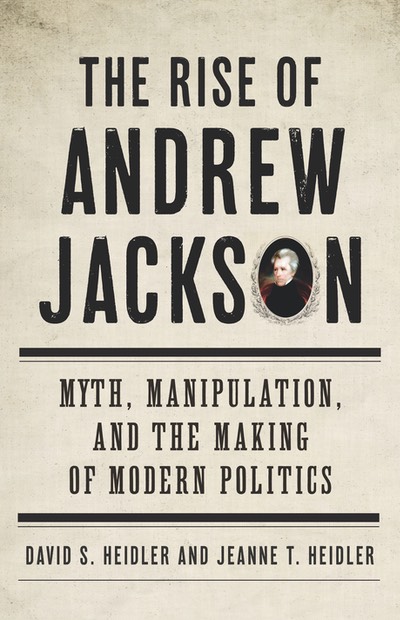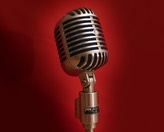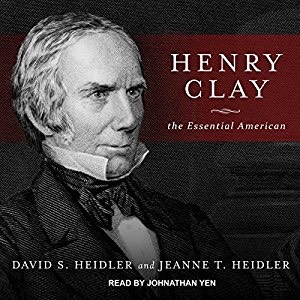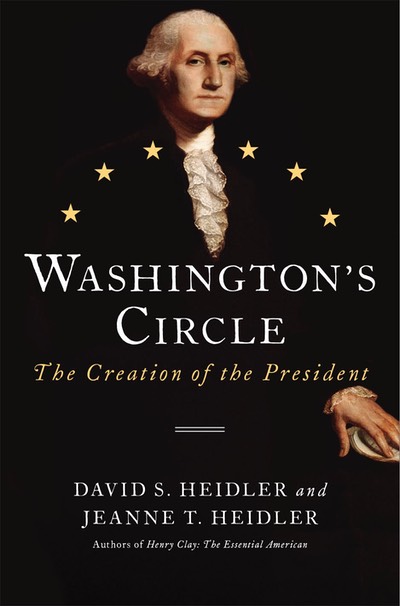We recently revived our periodic newsletter An American Album, and in the issue for this spring, we led with an excerpt from our forthcoming book, The Rise of Andrew Jackson: Myth, Manipulation, and the Making of Modern Politics. We thought that those who haven't yet taken An American Album plunge would enjoy a peek. Accordingly, we reprise it for this latest post. If it tickles your fancy, consider jumping over to the newsletter’s page on this site and signing up for the next delivery, which will be this summer.
Even better, preorder The Rise of Andrew Jackson for its launch on October 23, 2018, so you can get in on the fun right away. It is about Old Hickory’s quest for the presidency in which an intimate group of operatives at first and then a growing legion of supporters mounted the first modern political campaigns in American history. The story features a large cast of characters, some of them familiar, but others seemingly obscure, and not always because time and fading memories have made them so. Some chose to cloak themselves in as much obscurity as they could manage in such a public undertaking, which brings us to the subject of the excerpt just below.
John Overton was the driving force behind Andrew Jackson’s two political campaigns. He was a coordinator for a growing and complex organization, a defender who deflected scandals, a publicist who glorified Old Hickory’s military exploits and lauded what he described as Jackson’s impeccable integrity. Overton was also Jackson’s oldest and most enduring friend, strangely so, for the two were entirely different and would have seemed on the surface to be completely incompatible. But Overton was steadfast at the beginning, middle, and end, and when he was reaching that end, he confronted a dilemma that required a difficult decision.
_____________________________________________
John Overton read the letter. It was a hurtful document. That it denied his modest request for a small patronage post might have wounded his pride, but the worst of it was the letter's author. Overton had tried to secure the position delicately by avoiding a direct request to his friend Andrew Jackson. Instead, he had contacted William B. Lewis, his friend's toady. Overton did not need the post for money, though he had a prudent man's mild anxiety that there was never enough money for a possible emergency. Nor did he want it for influence, about which he was uniquely indifferent. Since helping to make Andrew Jackson the President of the United States, Overton had visited him in the presidential residence only one time. He resembled quiet, retiring John Coffee in that, both of them fierce in their attachment to Jackson but casual about what it could do for them. Good men defined friendship that way. Overton thought of himself as a good man.
He did not think William Berkeley Lewis was. During the years of the long political quest, Lewis had been universally disliked in Jackson’s inner circle and was loathed by some who chafed at his tattling, always served up sadly, and his unctuous manner, always perfectly adjusted to fit Jackson's moods. The tone of Lewis's letter to Overton was grating, a strange mélange of haughtiness and simpering. The post that Overton wanted, Lewis said, was not significant enough for a man of his standing. It also carried duties that would have been too taxing for Overton's health. Then Lewis went on for too long, as he was inclined to do, by explaining some political realities. It would not be a good idea for Overton to have the post because he lived in Nashville — "a small place" in Lewis's words — "and it might be considered, by the citizens of other states, as bestowing too many favors on it."
It was more than galling, the master engineer at the beginning of Jackson’s campaign for the presidency being lectured to about politics and patronage by the likes of William Lewis. Overton could have heard Lewis speaking the words in his hushed and mildly urgent way, the face in a concerned frown and the eyes insincerely sympathetic, a tone and an expression everyone had seen hundreds of times during the hard work of tamping down scandals and cultivating support. Lewis had been good at both, at least. Even John Eaton had to concede that much to the bootlicker, even though Eaton was one of those who did not merely dislike but loathed Lewis.
John Overton folded the letter to file it away. Perhaps he would read it again, but probably not. Filing pieces of paper was a long-held habit that reflected his passion for order, but it had become less about keeping a careful chronicle and more a sign of his eccentricities, such as covering his bald pate with a handkerchief or mindlessly working his toothless gums like a forest ruminant. The filing habit had produced an enormous archive of paper over the years, including a thick bundle of letters from Jackson that formed a substantial portion of it. Overton had carefully ordered them over the years, and they spanned a half-century. It was all there: the social ascent, the legal career, the violence to kill the gossip over the girl, the shady association with the alleged traitor, the military exploits, the political quest. Overton had been thinking about these letters from Andrew Jackson for months now, particularly about what to do with them. It weighed more on his mind of late, topping a list of worries that made for troubled days and wakeful nights. John Overton was fairly sure he was dying.
He and Andrew Jackson had known each other ever since Jackson first showed up on the western frontier, and though only a year separated them in age, Jackson had seemed coltish while Overton always seemed old. He was of Scottish ancestry and of Virginia stock, a family that moved from the Tidewater to the western part of the colony where John was born in 1766. After the American Revolution, the migrations continued with John and several siblings moving to Kentucky and finally, for him, to the Mero District of North Carolina on the Cumberland River, the place that would become Tennessee. In those days, it was beyond the edge of civilization. The little settlement on the Cumberland River called Nashville was merely a collection of blockhouses inhabited by intrepid pioneers living in a wilderness of dangers.
The widow Rachel Donelson was taking boarders, and Overton settled into a homestead where he shared a room and a bed with fellow lodger Andrew Jackson. Old John Overton (he was twenty-three) instantly became the best friend of Jackson, full of sass and vinegar at twenty-two. More, Overton became Jackson's confidant as the tall raw-boned redhead fell in love with the Widow Donelson's daughter, a slip of a (married) girl also named Rachel. None of these three could have suspected that their budding relations — both the friendly one between single men on a remote frontier and the romantic one between an impetuous lad and a fetching girl — would have profound consequences for their country.
So many years ago, a lifetime, in fact, from there to the vantage of old John Overton who at sixty-six had finally grown into his age. He was a small man who had always seemed frail, but in younger days his face showed breeding and refinement. He had begun to lose his hair early and tried to hide it with bangs over his high forehead, but his eyes remained expressive into old age. His toothless mouth made him look as if he had "swallowed his lips" and made his firm chin jut upward almost to touch a nose once Roman, now a beak. When he had begun his plans to make Jackson president, Overton's broad mouth often held the hint of a smile, and his measured voice gave soothing assurance that here was a man who knew what he was talking about, when he chose to talk about something. Overton was prudent by nature and guarded from experience. These qualities alone made him an invaluable ally for a man who was temperamentally impetuous and had a reputation for volatility.
Overton was also rich. Some said he was so beyond measure. Like Jackson, he was a lawyer and became a judge, but speculation in land was his business. His mastery of the tedious details of questionable titles and illegitimate claims allowed him to buy and sell acreage shrewdly and profitably. He and Jackson were often partners in land ventures in the early years, including the purchase of a coveted expanse at Chickasaw Bluffs. At first, it was of seemingly little value because of its Indian inhabitants, but after Jackson cleared them away with one of the treaties he described as a negotiated agreement, the site became Memphis.
Overton had no political ambitions for himself. Rather, he became a wise counselor who was always sensitive to the best possible option among an array of difficult choices. In 1814, shortly after Jackson's initial military exploits made him regionally celebrated, Overton began to assess the chances for Jackson's political career. He thought the Tennessee gubernatorial race would be a good start, but after Jackson's victory at New Orleans in 1815, the best possible option was no longer to become the procurator of a provincial outpost. Andrew Jackson should be president. The small group that would become known as the Nashville Junto began forming in his mind years before it fell into place one evening in what had become a bustling town on the Cumberland. It happened amid clouds of cigar smoke and hearty laughter, the kind of gathering where men begin to see the main chance, the right champion, and slowly close their hands around the possible to shape it into a certainty. The man with the sure voice sat at their head that night, and for several thousand nights after it, and nobody, not even old General Jackson himself, had thought to question his intuition, let alone his judgment.
It made the letter from Lewis all the more galling, but Overton would only file it away, another thing of this earth that was of fading importance, like dipping snuff with Margaret Eaton or listening to Emily Donelson play the pianoforte. He was never one for grudges in any case, just as he had never been particularly pious, and neither trait was going to change now as he contemplated a rendezvous with his Maker. At most, he filed away galling letters and bowed to the sensibilities of religious companions, especially Rachel, by tempering his habit of registering exasperation to say, “By Jupiter!” rather than "By God!" — though he could comically forget and turn the exclamation into "By G— Jupiter!" It made him an entertaining companion, even as he approached the end with stoicism and resignation.
Beneath that characteristic calm, though, was a concern. His archive of paper included sheaf after sheaf with broad strokes scrawled in anger and solicitude and all the emotions between, with secrets and plans, and always ending with the large name of the large man, his friend, now president. There was too much in those letters about everything, but especially about the series of calculated risks that had won the prize. Overton made his decision.



